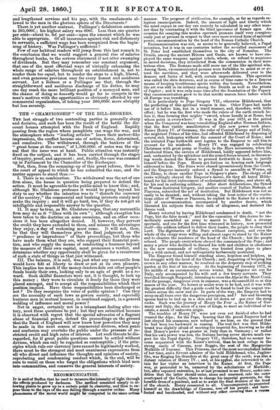THE " CHAMPIONSHIP " OF THE BILL-BROKERS.
THE last struggle of two contending parties is generally sharp and decisive, and such has been the result of the battle the dis- count houses attempted with the Bank of England. Rapidly passing from the region where pamphlets can wage the war, and the atmosphere where "leading articles" leave their meteor-like impressions, the conflict became one of action, fierce, determined, and conclusive. The withdrawal, through the bankers of the " great house at the corner," of 1,500,000/. of notes was the sig- nal that the issue was at hand. Public attention was instantly fixed on the subject, and it has been carried through the stages of inquiry, proof, and argument ; and, finally, the case was summed up in Parliament by the Chancellor of the Exchequer. But, then, from the summing-up of this great referee, there is the court of appeal to which he has submitted the case, and the matter appears to stand thus:—
I. There is no combination. The withdrawal was the act of one firm alone, the house in question being prepared to defend the action. It must be agreeable to the public mind to know this ; and, although Mr. Gladstone professes it would be going beyond his duty to say whether the intention was to " disturb the currency of the country," the commercial and banking interests surely may make the inquiry ; and it will go hard, too, if they do not get an intelligible and responsible answer to the question.
II. It may be true, as Mr. Gladstone urges, that any mercantile firm may, do as it "likes with its own" ; although exception has been taken to the doctrine on some occasions, and on other occa- sions it has been altogether denied. If, however, they pervert the credit they have extended to them' and misuse the advantages they enjoy,-a day of reckoning must come. It will not, then, be that they will themselves give the final judgment, on the " prudence or imprudence" of- their proceedings, but those who have made them what they are, who support their financial posi- tion, and who supply the means of conducting a business beyond the measure of their own capital, must pronounce a verdict, and determine whether any opportunity shall be given for a recurrence of such a state of things as that just witnessed.
III. The balance, it is said, was just what any mercantile firm would have felt at liberty to draw or not at its own pleasure. This implies too much if the money-lenders dole out other people's funds beside their own, looking only to an agio of profit as a re- ward. Such skilful financiers were not, it is thought, to lock up this money ; they were to circulate it freely for those they were placed amongst, and to accept all the responsibilities which their position implied. Have those responsibilities been discharged or not ? Do they recognize the voice of public opinion ? Can they see the necessity of such laws as govern society, and especially business men in mutual honour, in combined support, in a general welding of influence and moral power ?
Not in anger, certainly not in a triumphant feeling after vic- tory, need these questions be put ; but they are submitted because it is observed with regret that the special advocates of a flagrant abuse of financial power, defend the proceedings on the ground that the Bank of England will now know how powerless they may be made in the next season of commercial distress, when panic and confusion may overtake the public under the pressure of re- stricted credit and high rates of interest. Let such threats be dis- regarded, for if great public questions cannot be settled without devices, which can only be regarded as contemptible ; if the prin- ciples which rule our currency laws cannot be legitimately worked, there must be the strongest and most unanimous expressions from all who direct and influence the thoughts and opinions of society, reprobating and condemning conduct which, in the end, will be sure to recoil on those who forget the obligations which bind men into communities, and conserve the general interests of society.


























 Previous page
Previous page